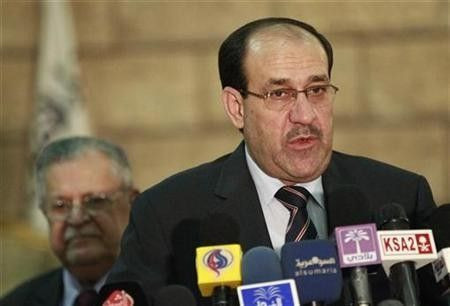Maliki, Iraqi Leaders To Form New Government

Iraqi leaders will meet Tuesday to begin the process of forming a new government amid an escalating crisis that has forced hundreds of thousands to flee their homes.
Vice President Khodair al-Khozaei announced last week that the government would meet to present a united front against a rapidly advancing Sunni insurgency. That urgency seems more apparent now, especially after Abu Bakr al-Baghdadi, the leader of the Islamic State of Iraq and Syria, which changed its name to the Islamic State, announced that his group had established an Islamic caliphate. ISIS now controls an area that stretches from Aleppo in northwestern Syria to Diyala in northeastern Iraq.
The meeting comes just one week after Prime Minister Nouri al-Maliki refused demands by Western leaders to form an emergency national unity government, one that Shiite cleric Moqtada al-Sadr, who leads the powerful Mahdi Army, strongly supported.
“I don’t see Maliki willingly agreeing to go,” said Denise Natali, a fellow at the National Defense University in Washington. “We put so much emphasis on Maliki. But this is systemic. This is institutional. The degree of distrust is way beyond Maliki.”
So far, Maliki has resisted pressure to bring Sunnis and Kurds into the highest levels of government. But as ISIS advances, he may see an inclusive coalition as a way to quell the insurgency.
Maliki’s Shiite-led State Law Coalition bloc won the most seats -- 92 out of 328 — in the April parliamentary election, which was supposed to give him a third term in office. Results will be considered final when the Iraqi High Electoral Commission, and the country's High Court, have addressed all disputes about the election. IHEC officials said last month that the final results would be released at the end of June or the beginning of July, according to Al-Jazeera.
According to the Iraqi constitution, a speaker and two deputies need to be elected. Within 30 days of those appointments, the assembly would need to choose a new president, who has 15 days to choose a prime minister from the largest bloc, in this case the Shiite-led State Law Coalition. Once the prime minister is elected, he has 30 days to present his Cabinet to the Parliament. The Parliament needs to approve the government with absolute majority.
As Iraqi leaders attempt to form a new government, they face an increasingly violent Sunni insurgency that shows no signs of slowing. The government, and its military, is desperately trying to take back the land it has lost to Sunni militants associated with ISIS. But more and more Sunnis in the country are taking up arms to fight with the militant group. Many of them who fled to Iraqi Kurdistan within the past two weeks have said any leader would be better than Maliki.
Maliki faces tough criticism both internationally and domestically for how he has handled the conflict in the country. It is unclear how the escalating violence will affect his political allies and their view toward him. If he were to reach beyond his Shiite base, he might be able to hold onto power, but his record shows little inclination to do so.
© Copyright IBTimes 2024. All rights reserved.





















